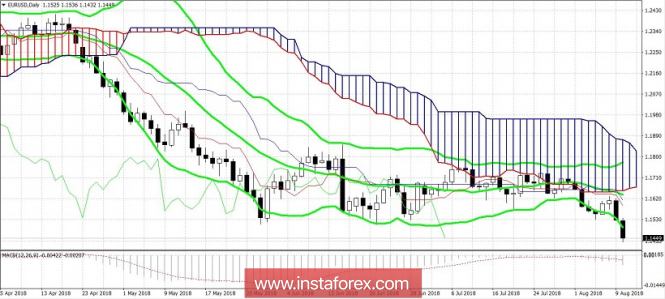So, the bears of the pair EUR / USD did not wait for the release of data on the growth of American inflation and pushed the price under an important support level of 1.1510, thus renewing the annual minimum. And it happened during the Asian session against the backdrop of an empty economic calendar. The traditional "stimulus" of the markets, Trump, this time, also remained silent, as well as the representatives of the Fed, which could provoke such a powerful price pulse.
At the moment, experts called the most likely version of the collapse of the euro. Strangely enough, but the catalyst for the southern impulse was Turkey, which is now in a state of economic crisis. In the opinion of market participants, this crisis can ricochet and hurt Europe, causing serious enough strikes on the European economy.
Recently, Turkey has faced a whole range of problems. First, the lira is rapidly becoming cheaper, the national currency has lost almost 30% of its value in relation to the dollar this year. The growing deficit of the current account of Turkey made the lira attractive for the "total" sale in emerging markets. Against the background of such dynamics, the yield of 10-year Turkish government bonds increased by almost 20%, reaching historical values.
The lira, which is cheaper by leaps and bounds, pushes up inflation, but consumer activity, on the contrary, decreases. Many local residents are reconsidering even their daily grocery set. For example, only potatoes have risen in price by three to four times compared to last year. A similar situation is observed in other areas, from the cost of fuel to rent for housing. However, according to most experts, everything that happens is just "flowers."
The fact is that Turkey is heavily dependent on imported capital. The country's economy largely depends on the inflow of foreign investment, and the volume of imports is many times higher than the volume of exports. Therefore, any restrictions in this sphere entail extremely negative, catastrophic consequences. Washington understands this perfectly, therefore, and aimed its sanctions on the most vulnerable and painful place. I will not go into the essence of the political conflict between the US and Turkey, we will only consider its economic consequences. At the moment, only personal sanctions are in force - the assets of the two acting ministers are frozen in the US, and Americans are forbidden to carry out any business deals with them. Of course, such measures are not capable of undermining the country's economy, so the essence of what is happening lies only in the future intentions of the White House.
So, according to the press, senators are likely to support the law, according to which Americans will be banned from approving loans for Turkey at the European Bank for Reconstruction and Development and at the World Bank. Given the dependence of Ankara on these financial institutions (Turkey is their largest borrower), it will be a serious blow for the country, which can even lead to bankruptcy. For example, in 2017, the Turks took the largest loan to the EBRD in almost two billion dollars. Turkey was also credited to many European banks. Among them are such large "fish" as Unicredit, BNP Paribas, and BBVA.
Now, if the lira is cheaper by another 8-10 percent (and such a scenario is very likely), many sectors of the economy will go bankrupt, primarily construction and energy. According to economists, this scenario will seriously affect the financial stability of large European banks.
Actually, this fact, which was voiced in the American press, and became the trigger that crashed the pair EUR / USD. The problem also lies in the fact that Recep Erdogan expanded his powers after the last election - in particular, now he can independently appoint the head and deputy heads of the Turkish Central Bank. This fact plays a big role in the context of the fact that Erdogan is against the tightening of monetary policy. And although the Central Bank raised its base rate to 17.75%, but stopped at this, in late July the regulator took a wait-and-see attitude, although many economists and politicians called for decisive action.
According to most analysts, the Turkish regulator should raise the interest rate immediately to 23-25%, in order to suspend the economic crisis. In their opinion, half measures, in this case, will be at least ineffective. However, the head of the Turkish state is not only opponents of half measures, but also, in general, any actions in this direction. And given the fact that the key decisions in the country are taken by the de facto Erdogan, it is not so difficult to foresee the decision of the Central Bank.

Thus, the European currency has another irritating factor, the crisis in Turkey. If the Turkish economy is on the verge of collapse, panic will affect the resolve of the members of the ECB and, accordingly, the euro.
The material has been provided by InstaForex Company - www.instaforex.com